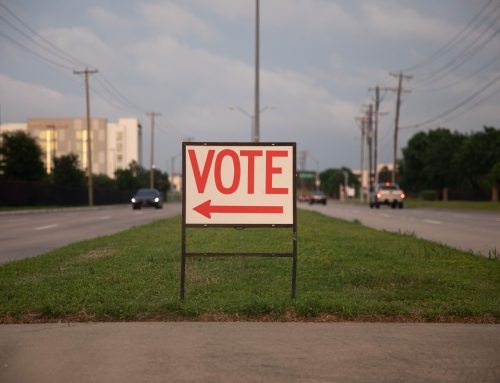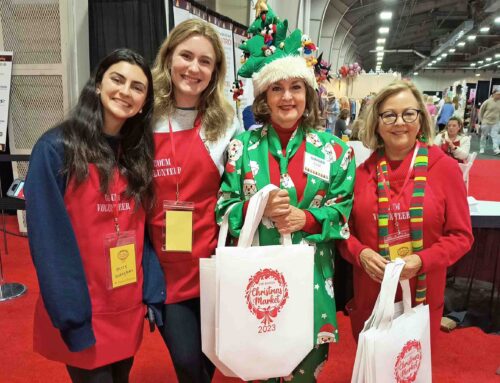Can you imagine paying $11 a semester for college tuition?
How about juggling three jobs, more than 12 hours a day, for just $15 a week? What about a time when it was scandalous for a woman to be seen in public without wearing gloves?
Some neighborhood residents don’t need imagination to conjure these images – they lived them.
In addition to raising their own families, these women devoted much of their lives to our neighborhood. They’ve tried to build a better life for the rest of us, acting as advocates for safe parks and recreational facilities, affordable housing, and cleaner, safer streets.
Blazing Trails in Politics and in Life
We have become used to politicians roasting each other over the coals. Elizabeth Blessing knows first-hand how it feels.
This 77-year-old alumna of Woodrow Wilson High School and Robert E. Lee Elementary was the second woman elected to the Dallas City Council, and the first woman to campaign for mayor, which she did in 1965 as an independent.
During her political career, Blessing says, she was accused of being unladylike and a bad mother. She was told to “go back to the kitchen,” she says, and newspapers printed what at the time was a shocking revelation – she campaigned without wearing gloves.
“I was told that with four children, I should have enough to do than be entertained by the City Council,” says Blessing, whose maiden name is Cupples.
“I was for integration, and I was labeled a communist. I was for the people being heard.”
Although Blessing lost the mayoral race to businessman J. Erik Jonsson, capturing less than one-third of the vote, she is heralded in the book “Daughters of Dallas” as a pioneer who helped open Dallas politics to women.
She served two terms on the Council as the East Dallas representative (re-elected by 61 percent of the vote) and often made news for being outspoken, especially as an opponent of racial segregation.
Today, the bright-eyed, light-hearted Blessing doesn’t dwell on the past. She’s too busy blazing new trails, and she’d rather talk about her church than herself.
Blessing spends her days working for Munger Place United Methodist Church, which she has attended since childhood. She is the full-time administrator and was instrumental in founding the East Dallas Cooperative Parish, a conglomeration of 12 neighborhood churches serving the disadvantaged by offering programs such as food pantries, English as a Second Language classes, and child immunization clinics.
Blessing’s office acts as the clearinghouse for the parish and its community projects.
“We’re interested in the holistic approach to community development,” Blessing says. “Everything in the community is important: the church, the school, housing, medical care, the whole spectrum of community life. The parish knows all the needs and is doing what it can.”
Blessing came to the parish full-time in 1990 after 24 years with Ebby Halliday Realtors. At one point, she also was the personal secretary to Ela Hockaday, whose Hockaday School formerly was located at Belmont and Greenville.
She and her husband, Bill (who died 20 years ago), also were independent real estate developers, turning much of what today is the Ridgewood Park area into residential neighborhoods. Blessing Drive, located in this area, is named after the couple.
With her real estate background, Blessing has taken special interest in providing adequate, affordable homes for low-income families.
On behalf of the parish, she manages Vienna Apartments, 5124 Live Oak, a 20-unit complex that provides reduced rent to poor and disabled neighbors.
Blessing says it’s exciting to help people get back on their feet and to be part of a community’s revitalization. She says age isn’t slowing her down.
“I’m getting as old as the hills. The hills are a bit older, but not much,” she says, chuckling. “I think life is a great adventure, full of possibilities and hope. The one thing you can depend on is change. If we’re inner-directed and do what’s right, it works out.”
“I’m looking forward to the future.”
This Super Volunteer Makes It All Look Easy
Mary Jane Beaman has worn many hats in her life.
She has been a teacher, an airplane inspector, a painter, a wife and a mother. She speaks French, Spanish and English and has lived in Hawaii, Japan, Paris and Cambodia. But this 78-year-old, Jane-of-all-trades always has called East Dallas home.
Dressed in a whimsical hat and Keds tennis shoes, Beaman pops up seemingly everywhere in our neighborhood and volunteers to help out with almost everything.
Her Bryan Parkway home is a library of information about community projects, from the latest zoning case to crime watch efforts. Boxes and file cabinets overflowing with minutes from meetings, newsletters and phone lists have overtaken rooms her family once lived in.
“It seems like there is always somebody coming up with another organization,” Beaman says with a smile. “I have so much junk, I can’t move. I’d have to have a humongous garage sale.”
Beaman (whose maiden name is Fitch) grew up on Moser Avenue and graduated from James W. Fannin Elementary and Woodrow. She earned a bachelor’s degree in art education from Texas Woman’s University and a master’s degree in English from Oklahoma State University, where she paid $11 a semester.
She returned to Texas to teach school, but when World War II broke out, she – like many women – went to work for the war effort while her fiance was sent to fight.
Prior to the war, Beaman had taken a hobby-like interest in flying and had been a recreational pilot. The experience landed her a job as an airplane inspector for North American Aviation in Grand Prairie.
“I worked all over the factory and got to know every part of it,” she says. “Many times, I worked seven days a week.”
The day the war ended, Beaman says she and the other women in the factory were fired.
So Beaman decided to concentrate on her first love – painting – and she married the man she loved, Milburn, who was a military recruiter. The job took the couple throughout the world.
Milburn died 15 years ago, and Beaman’s only child has long since moved from home. Beaman now spends her days working to improve our community.
Her volunteerism started in the 1970s, when she was recruited by a group of neighbors to help create the Swiss Avenue Historic District, which includes the street Beaman lives on. (Her home once was a halfway house for girls.) The district helped restore the Swiss Avenue neighborhood to the grandeur for which it is known today.
Through the involvement, Beaman became interested in beautification and formed Clean Dallas East, which evolved into Keep Dallas Beautiful, a group that organizes litter clean-up projects. Beaman still is a member of this group’s board of directors.
“You can’t revitalize a neighborhood when there’s trash in the streets and people don’t care what their property looks like,” Beaman says.
As for her painting, Beaman’s watercolors have been exhibited in Paris and in a show for local artists at the Dallas Museum of Art. Today, though, she’s too busy volunteering to do much painting.
But Beaman says to maintain a vibrant community, it’s important to know and help your neighbors.
“When I grew up on Moser Street, we all played together. The parents would all sit out in the yards together,” she says. “I still know the names of all the people who were on my block.”
“I still visualize Dallas as a city of yards and trees.”
She Can’t Stop Selling Our Neighborhood
At an age where most people are nearing the end of their careers, Virginia Belcher started hers.
In her 50s, Belcher found herself a two-time widow with bills to pay and no marketable skills, she says. This no-nonsense 84-year-old didn’t plan to become a community servant, but today she says her volunteer experiences have been the most rewarding in her life.
“I was not civic-minded in any way,” Belcher says about her younger years. “I wasn’t even involved in the PTA. I had never belonged to anything.”
“I was a late bloomer.”
But bloom, Belcher did. Sharp-tongued and sharp-minded, Belcher was quick to capitalize on her assets.
She moved back to East Dallas, her childhood home, after living with her husbands in Ohio and West Virginia. Here, she had a brother in real estate, and he encouraged her to enter the field. She became one of the City’s first female commercial real estate brokers.
She entered commercial instead of residential real estate because she says she wanted to break from her domestic days and learn about business. She discovered that she loved to sell.
“I’d sell pencils,” she says. “You meet so many interesting people. It sounds corny, but it’s true.”
Belcher’s civic work grew from her job. Once, after closing a big sale, a reporter wrote a story about her and then encouraged the Pleasant Grove (now Southeast Dallas) Chamber of Commerce to recruit her.
Belcher soon became involved in the East Dallas Chamber, as well, and served as the group’s recreation and cultural committee director.
During her tenure, a real estate deal was made that resulted in the Dallas Arboretum and Botanical Society locating in our neighborhood; the Bath House Cultural Arts Center on White Rock Lake was restored; and the Ridgewood Recreation Center, 6818 Fisher, was built.
Last summer, the recreation center was renamed for Belcher by the Dallas Park Department. She is a past Park Board member.
Belcher says well-maintained parks and recreational facilities are vital to business growth in Dallas.
“No company is going to come here if their employees aren’t going to be happy,” Belcher says. “You can’t set people in a desert unless you’re going to pay them a lot of money.”
“You have to be able to sell the City’s assets.”
Belcher (whose maiden name is Champion) already knew the area she came to sell. She grew up on Richard Street and attended Vickery Place elementary school at Miller and McMillan, where apartments now stand. She also attended St. Edwards school on Elm Street and spent just over a year at Southern Methodist University, from where her only son graduated.
The Great Depression forced her to leave SMU and find work, she says. From early morning to midnight, she juggled three jobs as a teacher, tutor and companion to the elderly and was paid $3 a day, she says.
Belcher still recruits members for the Arboretum and occasionally receives calls for advice about projects. She helps out when she can, but says she is ready to pass the baton to the next generation.
“East Dallas is a stable neighborhood,” she says. “It has kept up its standards.”
“It’s in good hands.”




